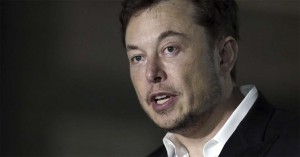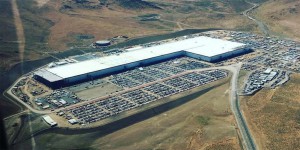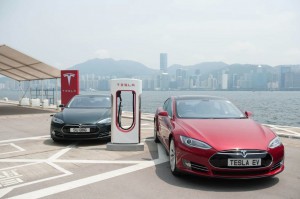
Tesla's Elon Musk spent much of his time on a call with analysts and media painting a rosy picture for 2019.
Tesla’s weak fourth-quarter earnings failed to impress industry analysts and investors, despite an optimistic, hour-long presentation by CEO Elon Musk who promised that the battery-electric automaker is ready to deliver solid profits “even if there’s a global recession.”
Speaking to reports and analysts, Musk presented an upbeat vision that anticipates a huge surge in both production and demand for the Model 3 sedan, while noting that two other products, the Model Y SUV and battery-powered Semi will go into production in 2020. The 47-year-old entrepreneur fended off concerns that Tesla won’t be able to cover an upcoming bond payment of more than $900 million without seeking new equity.
“2019 is going to be an amazing year for Tesla,” Musk said, later adding that he is “optimistic about being profitable in Q1. Not by a lot, but I’m optimistic about being profitable in Q1 and for all quarters going forward.”
That message may have fallen on deaf ears, however, the automaker’s stock tumbling sharply in after-hours trading. It probably didn’t help that the carmaker managed to eke out what Musk earlier in the month had described as a “tiny profit” of $1.93 a share, about 14% under the Wall Street consensus forecast, according to FactSet. And the CEO has also warned that Tesla faces a “very difficult” road ahead as it moves into the first quarter.
(Tesla misses Q4 earnings, raising new concerns. Click Here for the story.)
But things could start to accelerate from there was the message Musk kept sounding. For one thing, he dismissed concerns that demand for the Model 3, Tesla’s first mainstream model, is slipping. Quite the contrary, he repeated several times. “My guess is that demand is on the order of 700 (thousand), 800,000 units a year, and even in a recession is on the order of 500,000.”
That forecast takes into account the new plant that Tesla plans to open in Shanghai, perhaps before the end of 2019. That would help it get a firm foothold in what is now not only the world’s largest automotive market, but also the largest when it comes to plug-based vehicles.
Until now, demand there has been lighter than Tesla anticipated, Musk suggested, because “Our car is very expensive going into China.” That’s due to several factors, including shipping costs, import duties and the fact that imports don’t qualify for the incentives the Chinese offer for domestically produced plug-based vehicles. Those problems would become moot for vehicles assembled in the new Shanghai plant, he explained.
Musk sidestepped some questions, notably about why so many of the folks who placed early reservations for the Model 3 haven’t followed through with actual orders. It’s widely believed that they’re still waiting for the automaker to finally come through with the “standard range,” $35,000 model promised two years ago. For the moment, the lowest-priced Model 3 starts at $44,000 before the federal incentives currently being phased out.
The launch of the base Model 3 has been repeatedly delayed, though Musk told those on the earnings call “We expect to introduce the standard range Model 3 sometime probably middle of this year is a rough guess.”
(Click Here for more on Tesla’s plan to cut jobs.)

Tesla's Gigafacory in Reno, Nevada, will likely be where the company builds the Model 7 small SUV in 2020.
The automaker also plans to introduce its next product, the Model Y, next year. It should generate even more demand than the Model 3, “maybe 50% higher than Model 3, could be even double,” he suggested, pointing to the rapid market shift from sedans and coupes to SUVs and CUVs.
In one of the bigger surprises of the call, Musk said the new crossover-utility vehicle will likely be assembled at Tesla’s Gigafactory battery plant in Reno, Nevada, rather than the Fremont, California plant used for current products, including the Model 3.
The CEO also said he expects to launch production of Tesla’s battery-electric heavy-duty truck, the Semi, in 2020, though he did not discuss where it will be assembled.
Yet another new product, the Tesla electric pickup, Musk added, “we might be ready to unveil … this summer.” He did not offer a timeline for a production or sales launch, however.
For all the news about product, it was an announcement made at the end of the hour-long call that appeared to work up many investors, Musk revealing that Chief Financial Officer Deepak Ahuja will be retiring – for a second time. He’ll be replaced by Zach Kirkhorn, who is currently Tesla’s vice president of finance.
(To see more about Tesla’s new Gigafactory in Shanghai, Click Here.)
Ahuja was one of Tesla’s longest-serving managers when he stepped down in 2015. He agreed to come back after the sudden departure of Jason Wheeler, who served only a brief stint in the CFO job when he resigned in 2017. There has been a high turnover on Tesla’s financial staff, with Ahuja seen as one of the few signs of stability – and someone who could push back against the typically iron-willed Musk.

